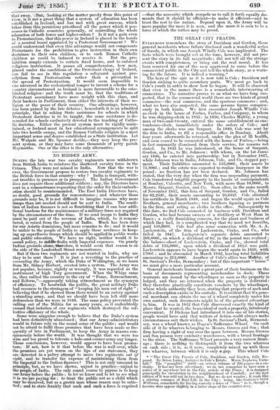NO HIDDEN ARMY.
Dunreo the late war two cavalry regiments were withdrawn from British India to reinforce the shattered cavalry force in the Crimea. They were not missed in India. Now that the war is over, the Government propose to restore two cavalry regiments to the British force in that country : why ? India is tranquil, with- out troubles in presence or in prospect. The Indian Government does not require these additional soldiers ; nay, the Directors have sent in a remonstrance requesting that the order for their embark- ation should be countermanded. The East India Directors have, no doubt, good grounds for remonstrance ; and whatever those grounds may be, it is not difficult to imagine reasons why more troops than are needed should not be sent to India. The condi- tion of Indian finances is not so flourishingthat it can bear addi- tional burdens for the maintenance of amilitaryforce not required by the circumstances of the time. If we send troops to India they must be paid out of the revenue of India, which, be it remem- bered, is raised from the people of India. Much has been done for our Asiatic dominions, •but more remains to do ; and it would be unfair to the people of India to apply those revenues in keep- ing up superfluous troops which should be applied in public works and public education. We have no right, neither would it be sound policy, to saddle India with Imperial expenses. On purely Indian grounds alone, itherefore, it would seem that reason is on the side of the Leadenhall Street remonstrance.
But if these two regiments are not wanted in India, why are they to be sent the ? It is just a reverting to the practice of concealing the Army, which the Duke of Wellington, as we learn from Mr. Sidney Herbert, erected into a system. The Army was not popular, because, rightly or wrongly, it was regarded as the instrument of high Tory government. When the Whigs came in, they rallied the country to the cry of " Peace, Retrenchment, and Reform,"—apparently taking retrenchment as the synonym of efficiency. To hoodwink the public, the great military Duke had recourse to the stratagem of " keeping his men out of sight " ; believing that if he showed them there would be an outcry against a standing army, and that we should have been left still more defenceless than we were in 1849. The same policy prevented the calling out of the Militia for so many years, as it undoubtedly caused that isolation of our regiments which destroyed the col- lective efficiency of the whole. Some were sanguine enough to believe that the Duke's system had been definitively abandoned ; that our Army-administrators would in future rely on the sound sense of the public ; and would not be afraid to fulfil those promises that have been made so fre- quently of late in Parliament, to keep the Army in masses con- spicuously before the world. It was thought that we were too wise and too proud to tolerate a hole-and-corner army any longer. Those conclusions, however, would appear to have been prema- ture. If not, how is it that before the war is well over, while the promises are yet warm on the lips of our statesmen, they are detected in a paltry attempt to move two regiments out of sight, and to transfer the expense of maintaining them from the Imperial to the Indian finances ? This is not only unsound in principle, but, as we have shown, unjust in practice—unjust to the people of India. The only sound course to pursue is to keep our Army before the public ; to let us know and to let us see what it is we are paying for ; to treat the public not as a child which may be deceived, but as a grown man whose reason may be satis- fied; and to state frankly that such and such a force is required
—that the necessity which compels us to call it forth equally de- mands that it should be efficient—to make it efficient—and to trust the rest to the nation. Depend upon it, the Army will be more popular the more it is seen, and the more it is seen to be a force of which the nation may be proud.


























 Previous page
Previous page